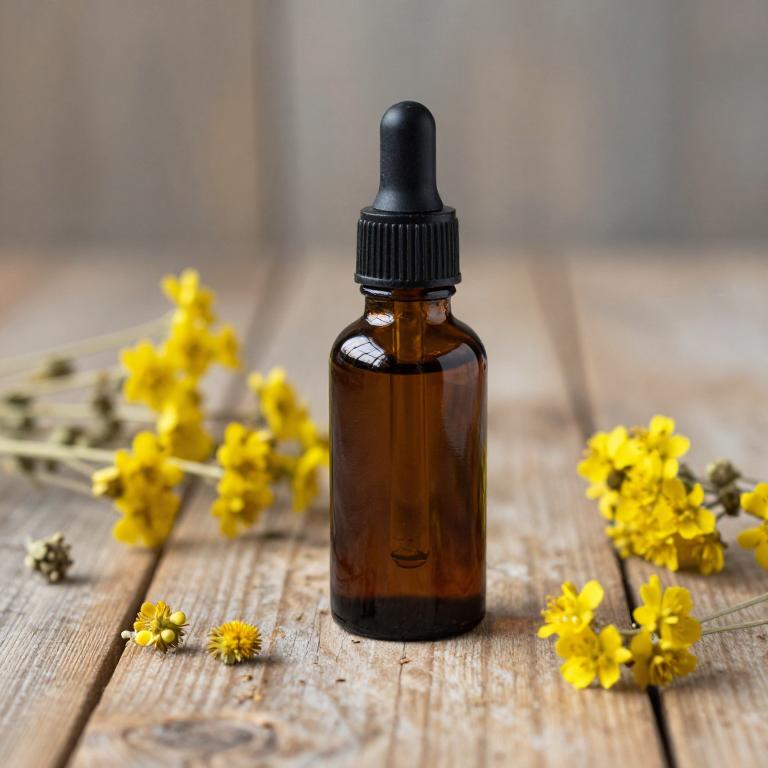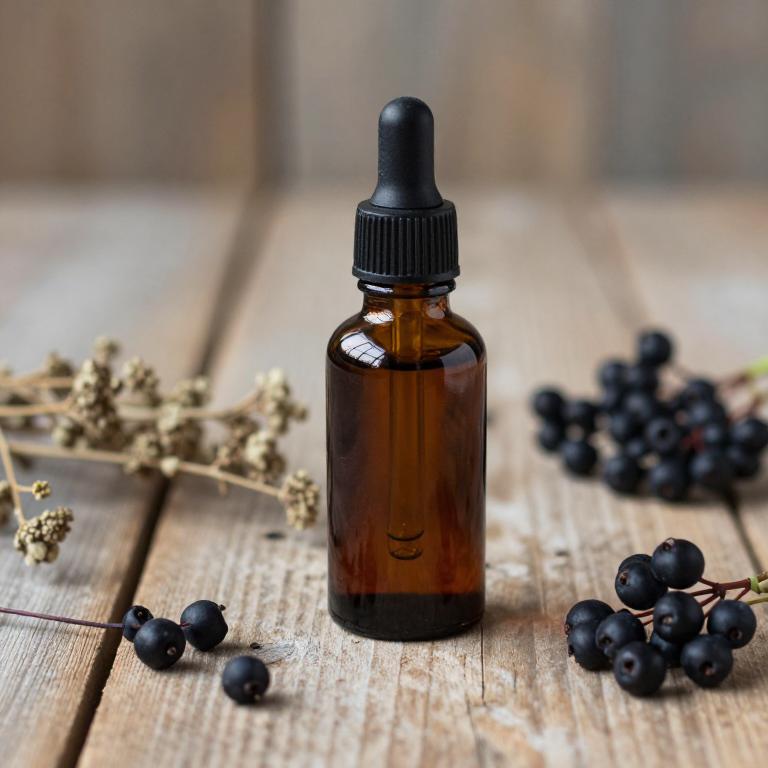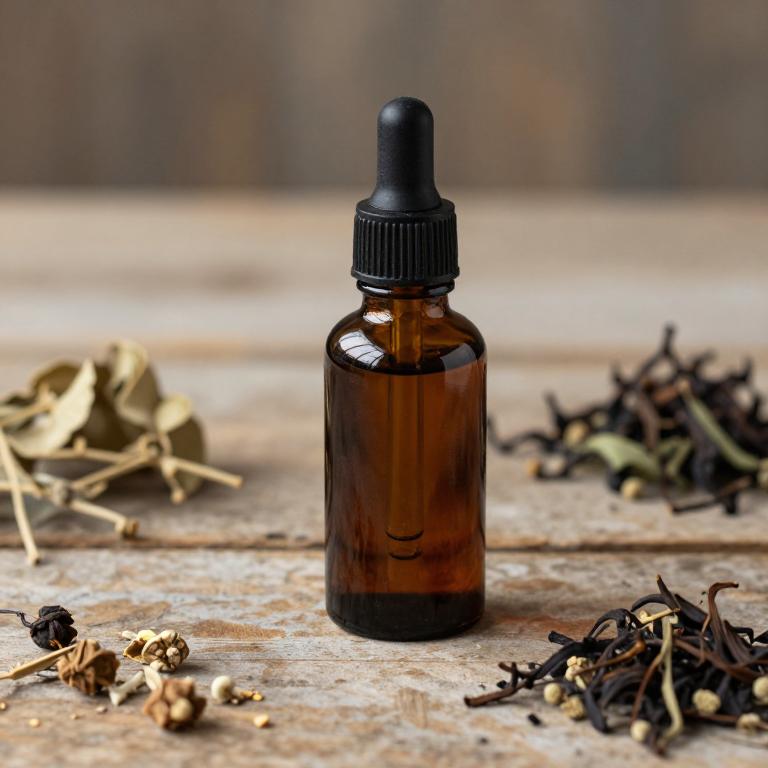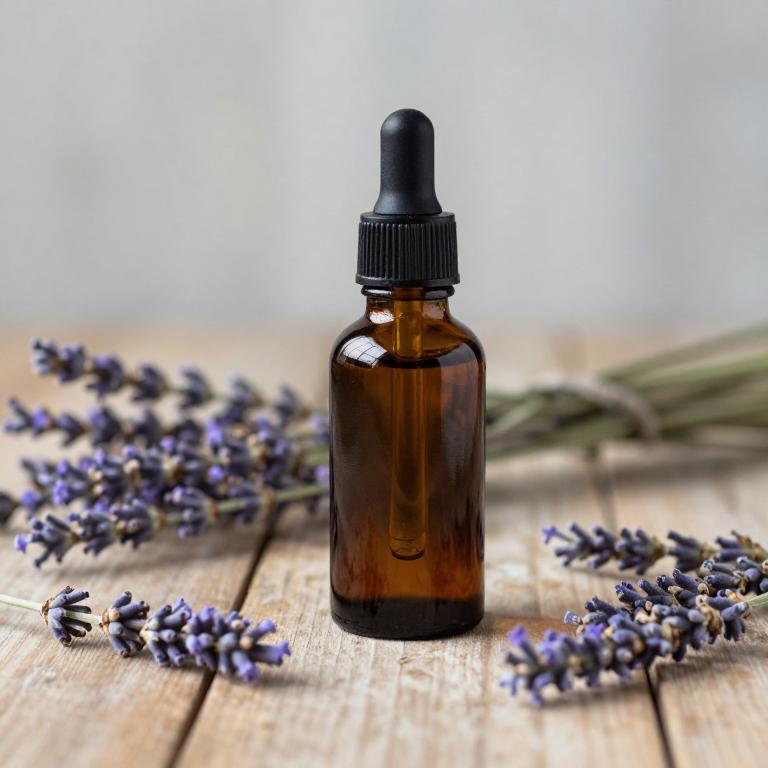10 Best Herbal Tinctures For Cold Sore

Herbal tinctures for cold sores are concentrated liquid extracts made from various plants known for their antiviral, anti-inflammatory, and healing properties.
Commonly used herbs include lemon balm, echinacea, calendula, and St. John's wort, each offering unique benefits in reducing the duration and severity of cold sore outbreaks. These tinctures can be applied topically to the affected area several times a day to soothe irritation and promote faster healing. Many people find them to be a natural and effective alternative to conventional over-the-counter treatments.
However, it is important to consult with a healthcare professional before using herbal tinctures, especially if you have underlying health conditions or are taking other medications.
Table of Contents
- 1. Echinacea (Echinacea purpurea)
- 2. St. john's wort (Hypericum perforatum)
- 3. Ginger (Zingiber officinale)
- 4. Yarrow (Achillea millefolium)
- 5. Marigold (Calendula officinalis)
- 6. Lemon balm (Melissa officinalis)
- 7. Black elderberry (Sambucus nigra)
- 8. Camellia (Camellia sinensis)
- 9. Dog rose (Rosa canina)
- 10. English lavender (Lavandula angustifolia)
1. Echinacea (Echinacea purpurea)

Echinacea purpurea herbal tinctures are commonly used to support the immune system and may help reduce the frequency and severity of cold sores caused by the herpes simplex virus.
These tinctures are typically made by steeping the dried roots and leaves of the echinacea plant in alcohol, creating a concentrated extract that can be taken orally or applied topically. Some studies suggest that echinacea may shorten the duration of cold sore outbreaks and alleviate symptoms such as pain and inflammation. However, it is important to consult with a healthcare professional before using echinacea, especially for individuals with autoimmune disorders or those taking immunosuppressive medications.
While not a cure, echinacea purpurea tinctures may serve as a complementary natural remedy for managing cold sore symptoms.
2. St. john's wort (Hypericum perforatum)

Hypericum perforatum, commonly known as St. John's Wort, is a herbal remedy that has been traditionally used for its anti-inflammatory and antiviral properties.
When prepared as a tincture, it can be applied topically to cold sores to help reduce symptoms and promote healing. The active compounds in hypericum perforatum, such as hypericin and hyperforin, may inhibit the replication of the herpes simplex virus. While some studies suggest it may be effective, it is important to consult a healthcare provider before use, as it can interact with certain medications.
Overall, hypericum perforatum tinctures offer a natural alternative for managing cold sores, though their efficacy can vary among individuals.
3. Ginger (Zingiber officinale)

Zingiber officinale, commonly known as ginger, has been traditionally used for its medicinal properties, and its herbal tinctures are gaining popularity for their potential benefits in treating cold sores.
These tinctures are typically made by soaking fresh ginger roots in alcohol to extract its active compounds, such as gingerol and shogaol, which have anti-inflammatory and antiviral properties. Some studies suggest that these compounds may help reduce the duration and severity of cold sores caused by the herpes simplex virus. When applied topically, ginger tinctures may help soothe the pain and discomfort associated with cold sores while promoting faster healing.
However, it is important to consult a healthcare professional before using ginger tinctures, especially if you have sensitive skin or are taking other medications.
4. Yarrow (Achillea millefolium)

Achillea millefolium, commonly known as yarrow, has been traditionally used for its anti-inflammatory and antiviral properties, making it a potential candidate for use in herbal tinctures aimed at treating cold sores.
When formulated into a tincture, yarrow may help reduce the duration and severity of cold sore outbreaks by supporting the body's immune response and promoting healing. The tincture is typically prepared by soaking dried yarrow herb in alcohol, allowing the active compounds to be extracted for topical application. While some studies suggest that yarrow may have antimicrobial effects, more clinical research is needed to confirm its efficacy specifically for cold sores.
As with any herbal remedy, it is advisable to consult a healthcare professional before use, especially for individuals with known allergies or underlying health conditions.
5. Marigold (Calendula officinalis)

Calendula officinalis herbal tinctures are commonly used for their soothing and anti-inflammatory properties, making them a popular choice for managing cold sores.
These tinctures are derived from the dried flowers of the calendula plant and are often diluted with alcohol or glycerin to create a safe topical application. While not a cure for cold sores, calendula tinctures may help reduce the duration and severity of outbreaks by promoting healing and easing discomfort. They are generally considered safe for most people when used as directed, though those with allergies to plants in the Asteraceae family should exercise caution.
Some individuals may find calendula tinctures to be a natural and effective alternative or complementary treatment for cold sore management.
6. Lemon balm (Melissa officinalis)

Melissa officinalis, commonly known as lemon balm, is a popular herb used in the form of tinctures to help manage cold sores.
These tinctures are often made by soaking fresh or dried lemon balm leaves in alcohol, allowing the active compounds to be extracted for topical application. Lemon balm is believed to have antiviral properties that may help reduce the duration and severity of cold sore outbreaks. When applied directly to the affected area, the tincture can soothe irritation and promote healing.
However, it is important to consult with a healthcare professional before using lemon balm tinctures, especially if you have allergies or are taking other medications.
7. Black elderberry (Sambucus nigra)

Sambucus nigra, commonly known as European elderberry, is often used in herbal tinctures to help alleviate symptoms of cold sores caused by the herpes simplex virus.
These tinctures are typically made by soaking the dried berries in alcohol, allowing the active compounds to be extracted for medicinal use. The high concentration of antioxidants and flavonoids in elderberry may help reduce inflammation and boost the immune system, potentially shortening the duration of cold sores. While some studies suggest possible benefits, more research is needed to confirm its efficacy for this specific use.
As with any herbal remedy, it is advisable to consult a healthcare professional before use, especially if you have underlying health conditions or are taking other medications.
8. Camellia (Camellia sinensis)

Camellia sinensis, commonly known as the tea plant, is the source of various herbal tinctures that have been explored for their potential benefits in treating cold sores.
These tinctures, often derived from green or black tea extracts, contain bioactive compounds like polyphenols and catechins that may help reduce the viral load of herpes simplex virus type 1 (HSV-1). Some studies suggest that these compounds possess antiviral and anti-inflammatory properties, which could aid in alleviating the symptoms of cold sores. While more research is needed to confirm their efficacy, many people use Camellia sinensis tinctures as a natural remedy to speed up healing and reduce outbreak frequency.
It is important to consult with a healthcare provider before using any herbal tinctures, especially if you have underlying health conditions or are taking other medications.
9. Dog rose (Rosa canina)

Rosa canina, commonly known as dog rose, has been traditionally used in herbal medicine for its potential anti-inflammatory and antiviral properties.
Rosa canina herbal tinctures are often used to support the body's natural defenses against cold sores caused by the herpes simplex virus. These tinctures may help reduce the duration and severity of outbreaks by promoting healing and boosting immune response. Typically prepared from the flowers and fruits of the Rosa canina plant, they are taken internally or applied topically as needed.
While they are generally considered safe, it is advisable to consult a healthcare professional before use, especially for individuals with existing health conditions or those taking other medications.
10. English lavender (Lavandula angustifolia)

Lavandula angustifolia, commonly known as English lavender, has been used for centuries for its calming and healing properties.
When distilled into a tincture, lavender offers a concentrated form of its essential oils, which can be beneficial for treating cold sores. The antiviral and anti-inflammatory compounds in lavender tinctures may help reduce the duration and severity of cold sore outbreaks. To use, apply a few drops directly to the affected area several times a day.
While lavender tinctures are generally safe, it is advisable to perform a patch test and consult with a healthcare provider, especially if you have sensitive skin or are taking other medications.